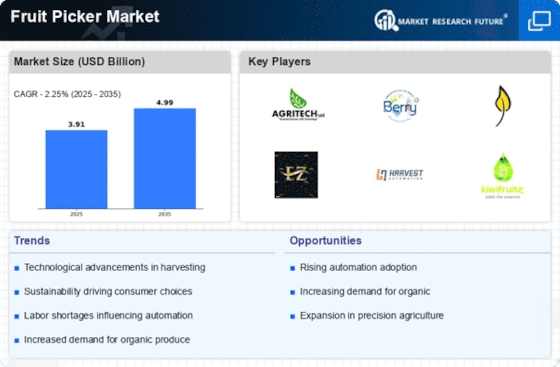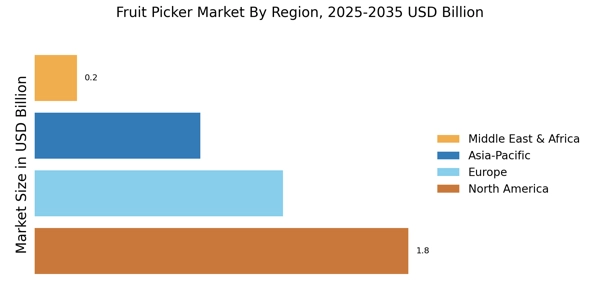Labor Shortages in Agriculture
Labor shortages in the agricultural sector are becoming a pressing issue, thereby impacting the Fruit Picker Market. Many regions are facing difficulties in finding sufficient labor for harvesting, which has led to increased interest in mechanized fruit picking solutions. The market for automated fruit pickers is expected to expand as growers seek to mitigate the effects of labor shortages. Reports suggest that the demand for labor-saving technologies could increase by 20% in the next few years. This trend highlights the necessity for innovation within the Fruit Picker Market to ensure that producers can maintain productivity despite workforce challenges.
Rising Consumer Demand for Fresh Produce
The Fruit Picker Market is significantly influenced by the increasing consumer demand for fresh and locally sourced produce. As health consciousness rises, consumers are seeking fresh fruits, which in turn drives the need for efficient harvesting solutions. Recent statistics show that the demand for fresh fruits has surged by 15% annually, prompting growers to enhance their harvesting capabilities. This trend necessitates the development of advanced fruit picking technologies that can meet the growing market needs. Consequently, the Fruit Picker Market is poised for growth as it aligns with consumer preferences for quality and freshness.
Sustainability and Eco-Friendly Practices
Sustainability has emerged as a pivotal driver in the Fruit Picker Market, as consumers increasingly prefer eco-friendly practices. The demand for organic and sustainably sourced fruits is on the rise, prompting producers to adopt environmentally responsible harvesting methods. This shift is reflected in the growing market for sustainable fruit picking equipment, which minimizes environmental impact. Data indicates that the market for eco-friendly fruit pickers is projected to grow by 25% over the next five years. As consumers become more conscious of their purchasing decisions, the Fruit Picker Market must adapt to these preferences, ensuring that sustainability remains at the forefront of innovation.
Government Support and Agricultural Policies
Government support and favorable agricultural policies are playing a crucial role in shaping the Fruit Picker Market. Various initiatives aimed at enhancing agricultural productivity and sustainability are encouraging investments in advanced harvesting technologies. For example, subsidies for purchasing modern fruit picking equipment are becoming more common, which can stimulate market growth. Additionally, policies promoting local food production are likely to increase the demand for efficient harvesting solutions. As governments recognize the importance of agriculture in economic development, the Fruit Picker Market stands to benefit from these supportive measures, potentially leading to a more robust market landscape.
Technological Advancements in Harvesting Equipment
The Fruit Picker Market is experiencing a notable transformation due to advancements in harvesting technology. Innovations such as automated fruit pickers and precision agriculture tools are enhancing efficiency and productivity. For instance, the integration of artificial intelligence and robotics in fruit picking equipment allows for faster and more accurate harvesting, reducing labor costs significantly. According to recent data, the adoption of these technologies has led to a 30% increase in harvesting efficiency in certain regions. This trend not only meets the rising demand for fresh produce but also addresses labor shortages in agriculture, making it a critical driver in the Fruit Picker Market.

















